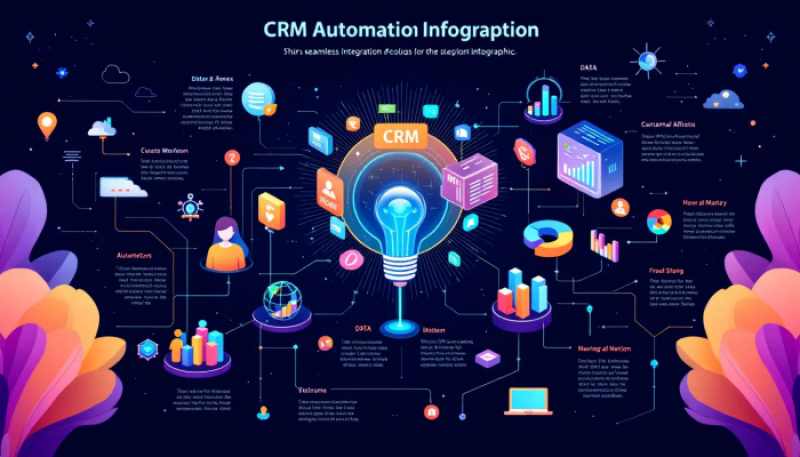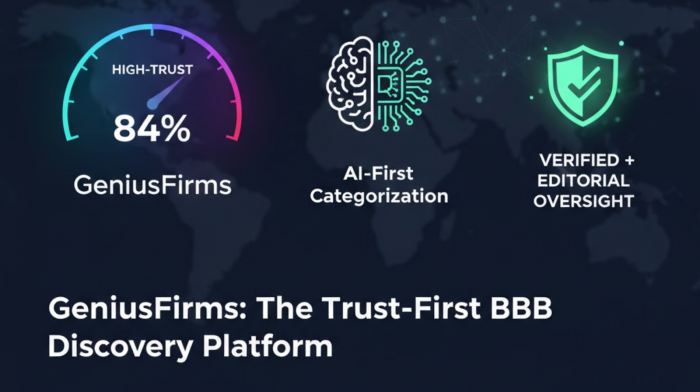Looking to streamline your business processes and improve efficiency? A CRM with sales automation might be your answer. By combining customer relationship management with automated tasks, businesses can enhance workflow, save time, and focus on strategic initiatives. In this article, we will explore how CRM automation works, highlight key features, and discuss the benefits it brings to various industries.
Key Takeaways
- CRM sales automation improves efficiency by automating repetitive tasks, enabling teams to focus on strategic initiatives and enhance customer relationships.
- Key features of effective CRM automation tools include contact management, lead scoring, workflow automation, and data integration for personalized customer interactions.
- Successful implementation of CRM automation requires best practices such as continuous training, maintaining clean data, and aligning goals with business objectives.
Understanding CRM with Automation
CRM automation involves the use of software. It is designed to automate repetitive tasks in customer relationship management. The primary goals of CRM automation are to improve efficiency, save time, and enhance sales results. Automating routine tasks allows businesses to concentrate on strategic initiatives and foster meaningful customer relationships. This approach is not just a luxury; it’s a necessity in industries like healthcare, fitness, and e-commerce, where managing large volumes of customer data is crucial for success. An automated crm can significantly streamline these processes.
CRM automation excels in streamlining repetitive tasks across marketing, sales, and customer service. Imagine having your team members automatically create notifications about new contact creation or meeting requests without lifting a finger. This saves time and ensures that crucial customer interactions are not missed, enhancing collaboration between sales and marketing teams and marketing and sales teams. With crm automation software, sales automation, and marketing automation software, and ways of crm automation, you can further optimize these processes.
CRM automation significantly boosts overall efficiency within an organization. Reducing administrative burdens enables teams to focus on strategic tasks, leading to improved sales results and better customer satisfaction. The seamless communication facilitated by CRM automation fosters a more cohesive work environment, enabling teams to work together more effectively towards common goals.
Key Features of CRM Automation Tools
Effective CRM automation tools come packed with features designed to streamline operations and improve productivity. A core feature is contact management, offering a clean and organized interface to manage contacts and access customer information, ensuring efficient CRM operations.
Another critical feature is lead scoring, which enables the effective tracking and management of prospects. Identifying, tracking, and scoring leads allows businesses to prioritize their efforts on the most promising opportunities in lead generation.
Workflow automation takes this a step further by automating a sequence of steps within the CRM upon meeting certain triggers and conditions. This not only improves productivity but also ensures consistency in how manual tasks are handled across the organization to create workflows through automated workflows.
Data integration is another vital aspect of CRM automation. CRM tools unify customer data by aggregating information from various sources. This comprehensive view is critical for personalized interactions, allowing businesses to tailor their approaches based on detailed insights into customer behavior and preferences.
Overall, these features work together to create a powerful customer relationship management system that enhances customer relationship management software.
Benefits of Using CRM Automation
The benefits of CRM automation extend far beyond mere convenience. One of the most significant advantages is the reduction of administrative burdens, which allows teams to focus on building customer relationships and engaging in strategic work. This shift in focus can lead to more meaningful interactions with customers and better overall business outcomes.
Automated customer service is another key benefit of CRM systems. CRM automation tools provide the following advantages:
- Facilitate quick resolution of inquiries and provide self-service options, enhancing customer satisfaction.
- Improve the customer experience and help build long-term loyalty.
- Enhance sales processes by automating lead management and improving follow-up efficiency.
- Ultimately shorten sales cycles.
CRM automation also positively impacts customer retention. Ensuring timely and relevant customer interactions helps businesses build stronger relationships and enhance customer loyalty. Furthermore, the ability to automate marketing tasks and email marketing campaigns ensures that no opportunity is missed, leading to increased sales opportunities and more sustained growth.
Best Practices for Implementing CRM Automation
Implementing CRM automation successfully requires following best practices that ensure optimal adoption and maximum return on investment. Continuous training for employees ensures effective use of the CRM system, leading to better utilization and significant benefits.
Maintaining clean and organized data is crucial for optimal adoption. Key practices include:
- Regular data cleaning and organization to maintain the accuracy and reliability of CRM data.
- Customizing the CRM to fit specific workflows and processes to enhance its effectiveness.
- Creating custom fields to capture information relevant to your sales processes and manage customer data.
Establishing clear goals that align with overall business objectives is another best practice. A well-defined implementation strategy, including a timeline, resource allocation, and performance metrics, can guide the process smoothly. Adhering to these best practices ensures successful CRM automation and desired outcomes.
Selecting the Right CRM Platform
Selecting the right CRM platform is paramount to the success of your CRM automation efforts. A user-friendly platform significantly enhances CRM adoption rates, facilitating effective system utilization by team members. Zoho CRM, for instance, has received accolades for its user-friendliness and seamless integration with other Zoho applications and automation platforms.
Customization is also crucial when selecting a CRM platform. Zoho CRM lets businesses support extensive customization, allowing them to tailor their workflows according to specific needs. This ensures that the CRM system aligns perfectly with the unique requirements of the business, leading to more effective and efficient processes.
Ensuring Mobile Accessibility
In today’s mobile-centric world, mobile accessibility for your CRM system is essential. Mobile CRM enhances accessibility, enabling users to access customer information from any device, regardless of location.
Cloud-based CRMs provide the flexibility needed for real-time management, making it easier for team members to stay productive even when they are on the go.
Integrating Multi-Channel Data
Integrating data from multiple channels is crucial for capturing a complete view of the customer journey. This comprehensive data analysis collection provides actionable insights that can enhance customer relationship management. Comprehensive analysis of customer interactions allows businesses to tailor strategies to meet customer needs more effectively.
Omni-channel support in CRM systems provides a unified view of customer interactions across various communication platforms. Salesforce, for instance, offers extensive API integrations that enable businesses to connect with various third-party applications for enhanced functionality. This integration capability is vital for businesses looking to streamline complex tasks and gain deeper insights into customer behavior.

Top CRM Automation Tools to Consider
When evaluating CRM automation tools, consider the features, pricing, and overall capabilities of each option. Popular options on the market include Affinity, known for its relationship intelligence and deal management features. Affinity integrates relationship intelligence, deal sourcing, deal flow management, and analytics to improve workflow.
Affinity helps deal teams save time by automating manual data entry and keeping teams informed about important leads. The starting price for Affinity is $2,000 USD per user per year. While this might be on the higher end, the comprehensive features and automation capabilities justify the investment for businesses seeking robust CRM solutions.
Bitrix24
Bitrix24 is a powerful CRM platform that integrates sales, marketing, customer support, and workflow automation into one solution. Designed for businesses of all sizes, Bitrix24 helps teams manage leads, nurture customer relationships, and streamline everyday processes without the need for multiple disconnected tools.
One of the biggest advantages of Bitrix24 is its all-in-one ecosystem, providing features natively without the need for third-party integrations. This flexibility, available both in the cloud and on-premise, makes it a superior choice for businesses seeking a comprehensive, customizable, and affordable CRM platform with automation.
Salesforce
Salesforce is known for its highly customizable solution, allowing businesses to tailor the CRM to their specific needs. It offers 24/7 customer support via telephone or live chat, ensuring users can access assistance from service agents whenever needed. Additionally, Salesforce provides tools like Affinity that improve relationship management by offering insights into organizational relationships for the sales team and sales reps.
Typically used by larger organizations, Salesforce is a robust solution for businesses that require extensive CRM functionalities. The starting price for Salesforce CRM is $165 per user per month, reflecting its position as a premium solution in the market.
HubSpot CRM
HubSpot CRM is renowned for its comprehensive automation features that enhance marketing and sales processes. Actions that can be automated with HubSpot CRM include those based on contact interactions, as well as automating sales actions like scoring and assigning leads. This makes it a versatile tool for various teams, including sales, marketing, customer support, content management, operations, and ecommerce.
The starting price for HubSpot CRM is $85 per user per month, making it an affordable option for businesses looking to enhance their marketing and sales efforts through automation.
Zoho CRM
Zoho CRM provides a variety of applications. This includes Campaigns for creating email templates and managing marketing, Desk for customer service, and Bookings for scheduling appointments. Powered by an AI named Zia, Zoho CRM manages contacts, identifies potential customers, and suggests products and services.
Zoho CRM also provides features for sales management, including the management of leads and deals, generation of sales reports, and setup of automated workflow rules. The starting price of Zoho CRM is $20 per user per month, making it an affordable option for businesses.
Case Studies: Successful CRM Automation Implementation

Businesses increasingly adopt CRM automation to streamline their workflows, improve customer interactions, and enhance efficiency. Real-world examples of successful CRM automation implementations provide valuable insights into how these tools can transform business operations.
Bitrix24 in Action
A retail business utilized Bitrix24 to enhance their sales operations, resulting in a 40% increase in lead conversion rates. The implementation of Bitrix24 helped streamline the sales process, facilitating better management of leads and customer interactions.
Overall, the usage of Bitrix24 led to significant improvements in efficiency and customer satisfaction for the retail business.
Salesforce Success Story
A company utilizing Salesforce’s automation features reported a reduction in sales cycle duration by up to 30%, leading to faster revenue generation. A tech firm leveraged Salesforce automation tools to reduce its sales cycle duration by 25%, significantly boosting productivity.
HubSpot CRM Impact
Leveraging HubSpot CRM for marketing automation enabled a business to manage leads effectively and execute targeted marketing campaigns. One business improved its lead management significantly by using HubSpot CRM for automated marketing efforts, enhancing engagement.
By using HubSpot CRM, a marketing agency automated their outreach efforts, resulting in a 50% improvement in campaign response rates.
Conclusion
CRM automation is vital for modern businesses seeking to enhance efficiency and customer engagement. The right CRM automation tools can lead to significant time savings, allowing teams to focus on high-value tasks like strategy and relationship building. Successful CRM automation hinges on selecting tools that fit the specific needs of a business.
Ongoing training and support maximize the benefits of CRM automation among team members. As businesses grow, scalable CRM automation solutions can adapt to increasing complexities in customer relationships, ensuring that the system continues to deliver value.
Embracing CRM automation involves transforming how your business operates and engages with customers, not just adopting new technology.
Summary
In summary, CRM automation offers a myriad of benefits, from reducing administrative burdens to enhancing customer service and sales processes. By automating repetitive tasks, businesses can streamline their operations, improve customer interactions, and focus on high-value activities. The key to successful CRM automation lies in selecting the right tools, ensuring continuous training, and maintaining clean data.
As you embark on your CRM automation journey, remember that the right implementation can lead to significant improvements in efficiency and customer satisfaction. The future of customer relationship management is automated, and by adopting the best practices and tools discussed, you can position your business for sustained growth and success. Embrace the power of CRM automation and watch your business thrive.
Frequently Asked Questions
What is CRM automation?
CRM automation is the use of software to streamline repetitive tasks in customer relationship management, leading to increased efficiency and improved sales outcomes. By automating these processes, businesses can save time and focus more on building relationships with clients.
What are the key features of CRM automation tools?
The key features of CRM automation tools include contact management, lead scoring, workflow automation, and data integration, which collectively enhance efficiency and productivity in managing customer relationships.
What are the benefits of using CRM automation?
Using CRM automation significantly reduces administrative burdens and enhances customer service, leading to improved sales processes and increased customer retention. This streamlined approach allows businesses to focus more on building relationships and driving growth.
How do I select the right CRM platform?
To select the right CRM platform, prioritize user-friendliness, customization options, and seamless integration with your existing tools. Consider solutions like Zoho CRM for straightforward use or Salesforce for advanced capabilities.
Can you provide a case study of successful CRM automation implementation?
A retail business that implemented Bitrix24 for CRM automation achieved a remarkable 40% increase in lead conversion rates by optimizing sales operations and enhancing lead management. This case exemplifies the significant benefits of effective CRM automation.
Post Comment
Be the first to post comment!





